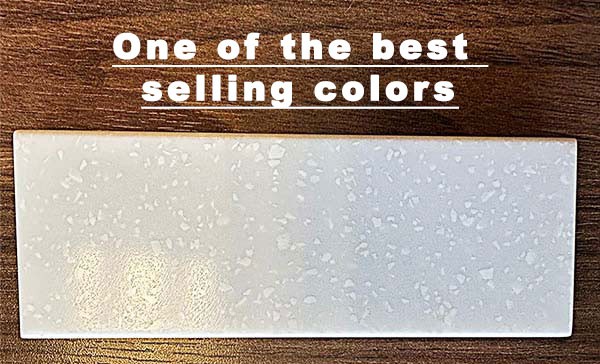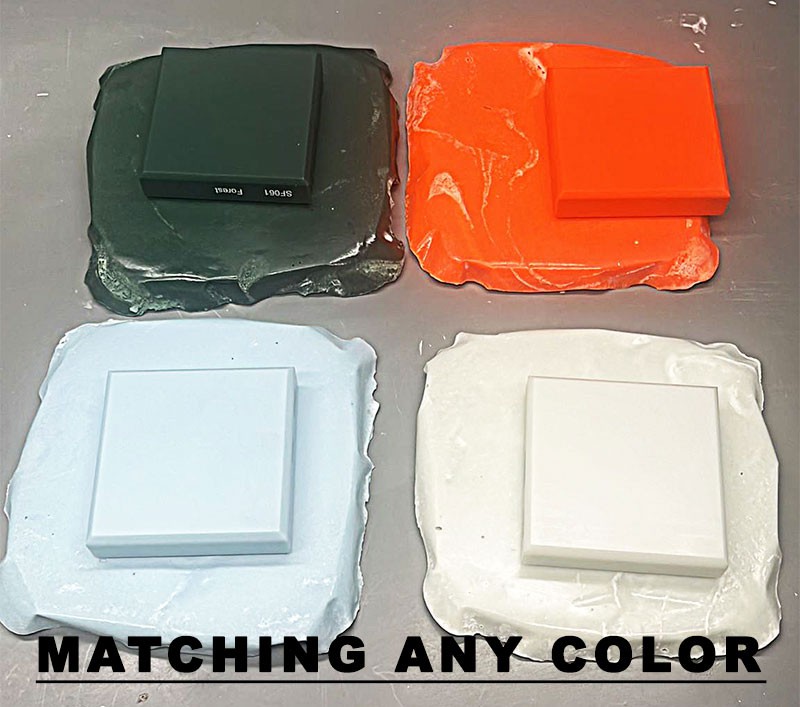Maryfass 100% Pure Acrylic Solid Surface Sheets Manufacturer in Turkiye
100% Pure Acrylic Solid Surface Sheets are a high-quality surfacing material made from acrylic resins and natural minerals. These sheets are prized for their seamless appearance, versatility, durability, and hygienic properties, making them a popular choice for countertops, sinks, wall cladding, and more in both residential and commercial spaces. Below is a detailed guide covering everything you need to know about 100% pure acrylic solid surface sheets:
1. What Are 100% Pure Acrylic Solid Surface Sheets?
Pure acrylic solid surface sheets are made entirely from acrylic resin, without any fillers like polyester. Acrylic resins are combined with mineral fillers (such as aluminum trihydrate) and pigments to create a durable, non-porous, and homogeneous material. These sheets are typically used in applications that require a high-quality, seamless finish, such as kitchen countertops, bathroom vanities, and other interior surfaces.
They are known for their exceptional durability, ease of repair, and customization options, making them one of the most popular choices in high-end interior design.
2. How Are 100% Pure Acrylic Solid Surface Sheets Made?
-
Material Composition:
- Acrylic Resin: This serves as the primary binding material, providing flexibility, durability, and excellent thermoforming capabilities.
- Natural Minerals: Typically aluminum trihydrate (ATH), which contributes to the strength, fire resistance, and durability of the surface.
- Pigments: Used to create a wide range of colors, patterns, and effects, mimicking natural stone or providing vibrant, solid colors.
-
Sheet Formation:
- Mixing: The acrylic resin, mineral fillers, and pigments are mixed together to form a homogenous slurry.
- Casting: The mixture is cast into molds, creating sheets of standard thickness (usually between 6mm and 12mm). These sheets can later be cut to fit specific design requirements.
- Curing: The sheets are cured to harden the material and ensure long-lasting durability. This process gives the solid surface its strength and resistance to wear and tear.
- Finishing: The cured sheets are sanded and polished to achieve a smooth, uniform surface. They can be finished in various textures, ranging from matte to high-gloss.
3. Advantages of 100% Pure Acrylic Solid Surface Sheets
-
Seamless Appearance:
- One of the key features of acrylic solid surfaces is their seamless appearance. The sheets can be joined together with special adhesives that create invisible seams, making it possible to create large, continuous surfaces without joints.
-
Durability:
- Pure acrylic surfaces are highly resistant to daily wear and tear, including scratches, stains, and impact damage. They are non-porous and impervious to water, making them ideal for wet areas like kitchens and bathrooms.
-
Hygienic and Non-Porous:
- The non-porous nature of acrylic solid surfaces means they don’t absorb moisture, dirt, or bacteria, making them highly hygienic. This makes them a perfect choice for areas that require cleanliness, such as kitchens, healthcare facilities, and bathrooms.
-
Thermoformability:
- Acrylic solid surface sheets are flexible and can be thermoformed into various shapes, including curves and custom designs. This allows for creative freedom in design and enables unique architectural elements, such as integrated sinks, backsplashes, or curved countertops.
-
Easy to Repair:
- If the surface gets scratched or damaged, it can be easily sanded and polished to restore its original appearance. This is one of the significant advantages over materials like granite or quartz, which are more challenging and costly to repair.
-
Customizable:
- Acrylic solid surface sheets are available in a vast range of colors, patterns, and finishes. They can mimic natural materials like marble or granite or be customized with unique colors and designs that complement modern aesthetics.
-
UV Resistance:
- 100% pure acrylic sheets generally have good UV resistance, meaning they are less likely to discolor or fade when exposed to sunlight. This makes them suitable for outdoor use or in areas with high natural light.
-
Sustainability:
- Many manufacturers offer eco-friendly options for acrylic solid surfaces, which can contain recycled materials. Additionally, the longevity and durability of these surfaces contribute to their sustainability by reducing the need for replacements.
-
Fire-Resistant:
- Due to the presence of mineral fillers like aluminum trihydrate, acrylic solid surfaces are inherently fire-resistant, which is a critical factor in commercial and public spaces.
-
Low Maintenance:
- Acrylic surfaces are easy to maintain and clean with basic household cleaners. There’s no need for sealing, which is often required for natural stones.
4. Disadvantages of 100% Pure Acrylic Solid Surface Sheets
-
Cost:
- While acrylic solid surface sheets are highly durable and versatile, they tend to be more expensive than materials like laminate or polyester-based solid surfaces. However, they are still more affordable than natural stones like granite or quartz.
-
Scratch Sensitivity:
- Although acrylic solid surfaces are durable, they are more prone to scratches than harder materials like granite or quartz. Minor scratches can be buffed out, but more significant damage may require professional refinishing.
-
Heat Sensitivity:
- Acrylic surfaces are less heat-resistant than natural stone or quartz. Placing hot pots, pans, or styling tools directly on the surface can cause heat damage, such as discoloration or warping. Trivets and heat pads are recommended to protect the surface.
-
Not as Hard as Stone:
- While acrylic solid surfaces are strong, they are not as hard as stone materials like granite or quartz, meaning they can dent or crack under severe impact.
5. Applications of 100% Pure Acrylic Solid Surface Sheets
-
Kitchen Countertops:
- Acrylic solid surfaces are widely used in kitchens for countertops due to their non-porous, stain-resistant, and easy-to-clean properties. They are also ideal for creating integrated sinks and seamless backsplashes.
-
Bathroom Vanities and Sinks:
- The non-porous, hygienic, and moisture-resistant properties make acrylic surfaces perfect for bathroom vanities and integrated sinks.
-
Shower Walls and Tub Surrounds:
- The seamless installation of acrylic solid surface sheets makes them ideal for wet areas like showers and tubs, where they resist mold, mildew, and water penetration.
-
Healthcare Facilities:
- In healthcare environments, acrylic solid surfaces are often used for countertops, sinks, and wall cladding due to their hygienic, easy-to-clean nature, which helps in maintaining a sterile environment.
-
Reception Desks and Office Spaces:
- In commercial applications, acrylic surfaces are used for reception desks, workstations, and conference tables because of their professional appearance, durability, and ability to be customized to fit the design theme.
-
Furniture:
- Custom furniture pieces, including tabletops, shelving, and cabinetry, can be made using acrylic solid surfaces due to their flexibility and variety of available finishes.
-
Exterior Cladding:
- Some acrylic surfaces with UV-resistant properties are suitable for exterior applications, including cladding and outdoor furniture, due to their durability and resistance to fading.
6. Comparing 100% Pure Acrylic to Other Solid Surface Materials
| Feature | 100% Pure Acrylic Solid Surface | Polyester Modified Solid Surface | Quartz | Granite |
|---|---|---|---|---|
| Durability | Highly durable, repairable | More brittle, prone to cracking | Very durable, not repairable | Extremely durable, not repairable |
| Heat Resistance | Moderate, may discolor under heat | Less heat-resistant | Very heat-resistant | High heat resistance |
| Scratch Resistance | Can be scratched, but repairable | More prone to scratches | Very scratch-resistant | Scratch-resistant |
| Seamless Appearance | Seamless with invisible joints | May show seams | Seams visible | Seams visible |
| Thermoforming | Highly thermoformable | Limited thermoformability | Cannot be thermoformed | Cannot be thermoformed |
| Maintenance | Low maintenance, easy to clean | Low maintenance, but more delicate | Low maintenance | Requires regular sealing |
| Price | Mid to high range | Lower cost than acrylic | High cost | High cost |
7. Maintenance and Care for Acrylic Solid Surfaces
- Daily Cleaning: Clean with mild soap and water or a non-abrasive cleaner. Avoid abrasive pads, as they can scratch the surface.
- Prevent Heat Damage: Always use trivets or heat pads to protect the surface from hot objects.
- Avoid Harsh Chemicals: Use gentle cleaners and avoid harsh chemicals like bleach or strong acids. For tougher stains, use a dedicated solid surface cleaner or a baking soda paste.
- Buffing Out Scratches: Minor scratches can be removed with fine-grit sandpaper or by polishing with a soft cloth. Deeper scratches may require professional repair.
Conclusion
100% Pure Acrylic Solid Surface Sheets are an excellent choice for those seeking a high-quality, durable, and versatile surfacing material. Their seamless appearance, ease of repair, and wide range of customization options make them ideal for both residential and commercial applications. While they may require care to avoid heat and scratch damage, their non-porous nature, durability, and aesthetic versatility make them a long-lasting and attractive option for kitchens, bathrooms, and more.
provides high performance material in superior standards. Solid surface is a sheet good material that can be cut, shaped and fabricated by a professional fabricator using techniques similar to wood working preferred in kitchens, bathrooms, restaurants, hospitals, laboratories, schools, and any decorative designs.
Its primary use is as a countertop, benchtop surface, wash basin, and wall panel. It is composed of acrylic polymer and alumina trihydrate (ATH), a material derived from bauxite ore.
The homogenous structure of ‘Maryfass sheets’ allows easy restoration and high level of hygiene. The solid micro level structure of ‘Maryfass sheets’ inhibits the growth of bacteria or fungi.
Highly durable and resistant to stains, and burns. This makes it an ideal choice for high-traffic areas like kitchens and bathrooms. Easy to clean: Corian countertops are easy to clean and maintain, and do not require any special cleaning products or techniques.
Acrylic is a very strong material that is resistant to chips and cracks. This means that your sink will look great for many years to come. In fact, acrylic sinks have been known to last for decades without showing any signs of deterioration. Additionally, acrylic sinks are also very easy to clean and maintain.
Acrylic countertops can be easily customized for your bathing space and come with invisible seams. Most importantly, it is rated excellent for hygiene, stain resistance, and mold and moisture resistance because of its non-porous nature.
Maryfass solid surface sheet seamless in design and non-porous, which means there are no grout lines and there's no place for bacteria and mold to take root. Stains are also a thing of the past as they are unable to penetrate the surface, making everyday clean up quick and easy. When it looks clean, it really is clean!
Maryfass Acrylic Group is the manufacturer of solid surface acrylic sheet in Turkey with it’s capacity of 500.000 tons of production per month.
What are the benefits of acrylic solid surface?
Benefits of Solid Surface:
- Aesthetic.
- Highly Durable.
- Hygienic & Easy to Clean.
- Easily Repairable.
- Flexible in Form.
- Sustainable.
- Non-Porous.
What is the difference between acrylic and polyester solid surface?
Polyester countertops cannot be thermoformed into interesting designs because they will break. Acrylic, on the other hand, can be bent and shaped without sacrificing its structural integrity.






















